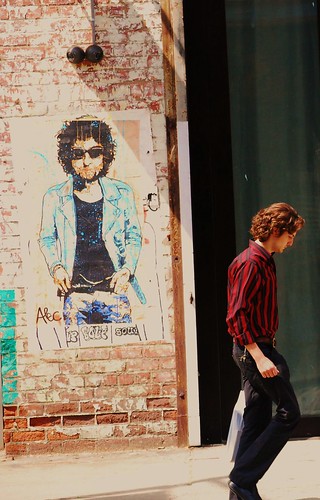Last week we clued you into the “I Love Vinyl” parties. Today, meet one of the DJs behind the parties, Jon Oliver, also the host of “The Main Ingredient,” Tuesdays from midnight to 2 a.m. on East Village Radio. This video kicks off a week-long tribute to the neighborhood’s Party People: the DJs, bartenders, waitresses, musicians, and drag queens who keep the East Village popping.
EAST VILLAGE RADIO
Talking Points | A Dylan Mystery
By KENAN CHRISTIANSENToday we begin a recurring series of interviews with local experts who will offer their takes on cultural issues, trivia questions and current events concerning the neighborhood.
On Tuesday, American songwriting legend Bob Dylan celebrated his 70th birthday.
In a career that’s spanned 40 years and has had more than its share of mystery, one of the most enduring questions concerns Dylan’s disposition toward the Village and the meaning of the song, “Positively 4th Street.”
Some say the song was meant as a rebuke of all the plastic folkies Dylan met while living in the Village, while others claim it was Dylan’s way reacting to being booed, after leaving his fan-base to go electric at the Newport Folk Festival in 1965, and still others say Dylan was merely talking about the “many 4th streets of his life.” In any case, the song provoked a widespread feeling of individual unease by directing it’s accusations toward a universal “you:”
“You got a lotta nerve
To say you are my friend
When I was down
You just stood there grinning”
The Local East Village contacted Jeff Conklin, co-content Director for East Village Radio to provide his take on the song and Dylan’s relationship to the East Village.
What’s your interpretation of the song “Positively 4th Street?”
Quite simply jealousy. The song reminds me of a bucket full of crabs, where one crab is inching to get out and all the other crabs are trying to pull him back down. That’s my example of what happened to Dylan, anyway.
“You got a lotta nerve
To say you got a helping hand to lend
You just want to be on
The side that’s winning.”
He had to be angry when he wrote it. It’s a great song.
Read more…




